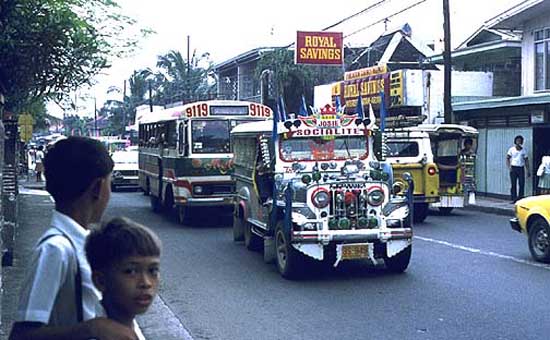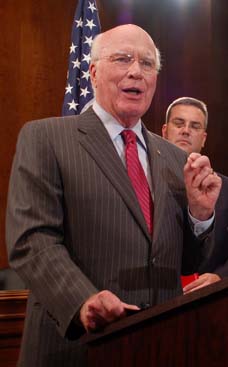
In my crude psychobabble: The Philippines continues to suffer from the effects of American-style colonialism, a status not usually associated with the world's leading democracy. Progressives usually love to tag the European powers as dastardly colonialists, but, to me, the United States has its own arrogant colonialist history, and the Philippines is example number one of an American colony. Here's a vivid image that recurs for me: I was with other Peace Corps Volunteers on Luneta Avenue in Manila, near the U.S. Embassy, during a loud protest demonstration by Filipinos, mostly college-age young people. I don't remember the exact trigger of their protest -- remember, this was the 1960s, and the American revolution (anti-war, pro-civil rights, countercultural) had worldwide impact. But as a group of Filipino protestors, shouting out anti-American slogans, saw us, a few seemed genuinely embarrassed and apologetic. "Oh, we don't mean you," one said to us Americans. (It was more for the benefit of my white Peace Corps colleagues, for my Chinese face wasn't immediately recognized as "American.") Another memory from more than 40 years ago: The Filipino attorney who hosted me in Iligan City in the big southern island of Mindanao would frequently lament the sorry state of democracy and politics in his home country. More than once, he said to me, "What we need is a dictator." This was during the Marcos presidency, when graft and corruption were allegedly rampant, and little, if any, progress was made to lift up millions of Filipinos in poverty. A stark indicator of continuing economic woes in the Philippines is the huge number of Filipinos who work abroad and who send back money to support their families and the Philippines economy. According to the New York Times, eight million Filipinos, or fully one quarter of the country's work force, "is its leading export." Filipinos make up the second largest Asian ethnic group in the United States, after ethnic Chinese. Filipino immigrants and Filipino Americans are, like many other ethnic groups, integral to the American economy and our nation's growing cultural diversity. Well, my friend got the dictatorship he and other Filipinos sought, at least in the privacy of their homes. Then they got their democracy back, thanks to Cory Aquino and lots of brave souls, including many Filipino Americans.
William Wong writes: Cory Aquino's recent death surfaced the unchanged nature of the Philippines, which apparently is still saddled by post-colonialism stress and has yet to transform itself into a dynamic, economically strong nation
The Unchanging Philippines
The headline in a recent New York Times, "Filipinos Lament How Far They Haven't Come," really caught my eye.
The article below the headline was an analysis by Seth Mydans in the aftermath of former Philippine President Corazon C. Aquino's death. Widely known as Cory, she led what was called a "revolution" to restore democracy to the Philippines in 1986 after Ferdinand Marcos' 20 years of dictatorship.
"...the weeks since Mrs. Aquino's death at the age of 76 have been a period of self-examination and self-doubt among many Filipinos, as they consider how little has really changed since then. 'The legacy is the mess we are in,' said F. Sionil Jose, 84, the nation's most prominent novelist, pointing to continuing poverty, inequality and political disarray as evidence that the nation failed to capitalize on its moment of possibility."
Oh, dear.
I spent 40 months in the Philippines in the mid-1960s, as a Peace Corps Volunteer, so this updated analysis of what's happening, or not happening, there struck a chord with me.
Article from Summer 1967 Ang Boluntaryo, a publication of the Peace Corps/Philippines program.
Photo by William Wong
Article from Summer 1967 Ang Boluntaryo, a publication of the Peace Corps/Philippines program.
Marcos came to power as a democratically elected president during that period. He and his eccentrically glamorous wife, Imelda -- she of the thousands of shoes -- once hosted Peace Corps Volunteers like me at Malacanang, the presidential palace in Manila. She wore only one pair of shoes during that occasion, as memory serves. Both enjoyed general popularity during his first term.
Then he decided to become a dictator. And he and Imelda drew scorn throughout the island archipelago and in America too, especially among Filipino Americans. After two decades of the Marcos dictatorship, the Filipino people, led by Cory Aquino, got fed up and took back their country, with high hopes of breaking the political grip of the oligarchy of wealthy families and at the same time reducing the rampant poverty.
The Philippines is one of those countries that doesn't get a lot of attention, unless there's a major crisis like the Marcos dictatorship and the Cory Aquino revolution.
There are occasional stories about coup attempts, natural disasters, and a continuing relatively low-grade civil war between the dominant Catholic Filipinos and their Muslim brethren, mostly in Mindanao. During the post-9/11 terrorism attack, there were a few sidebar stories about Muslim Filipinos possibly being affiliated with the al-Qaeda network.
Few, if any, of these stories make the front pages of U.S. newspapers or lead network newscasts.
Otherwise, the Philippines recedes into the international landscape that in recent years has been dominated -- at least in America -- by places like Iraq, Afghanistan, Iran, the always volatile Israeli-Palestinian conundrum, and sometimes China and India as economic threats.
The Philippines, however, is one of those countries that is inextricably linked to the United States. The Southeast Asian nation, after all, was a U.S. colony, a "prize" for the victorious U.S. in the Spanish-American War in the late 1800s. Before that, the Philippines was under Spanish Catholic rule for some 300 years.
One legacy of American occupation during the first half of the 20th century was a governmental and educational system fashioned after the U.S. model. Thus, the English language is widely spoken and understood, making the cultural and linguistic adjustment for Filipino immigrants to America relatively easier than for immigrants from countries where English isn't taught in grade schools and government structures aren't modeled on the United States.
If I heard it once, I heard this glib description a thousand times in conversations among Peace Corps Volunteers and Filipino intellectuals over ice-cold San Miguel beers: the Philippines was ruled by the Pope, then by Hollywood for hundreds of years, before the country gained independence in the 1940s.
That's why the Philippines has had such a tough time gaining traction as a truly independent, self-sufficient nation, the intellectuals implied. There were vague hints of a lingering inferiority complex and a continuing subservience to a white ruling establishment that controls U.S. foreign policy as well as geopolitical and geoeconomic affairs.
A prime example of Philippines subservience to U.S. foreign policy imperatives was during the Vietnam War, which happened to be raging at the time I was in the Philippines serving the cause of peace. Subic Bay Naval Base and Clark Air Force Base were prime U.S. military real estate, the launching pad for numerous forays into Vietnam, Cambodia and Laos.
In my crude psychobabble: The Philippines continues to suffer from the effects of American-style colonialism, a status not usually associated with the world's leading democracy. Progressives usually love to tag the European powers as dastardly colonialists, but, to me, the United States has its own arrogant colonialist history, and the Philippines is example number one of an American colony.
Here's a vivid image that recurs for me: I was with other Peace Corps Volunteers on Luneta Avenue in Manila, near the U.S. Embassy, during a loud protest demonstration by Filipinos, mostly college-age young people.
I don't remember the exact trigger of their protest -- remember, this was the 1960s, and the American revolution (anti-war, pro-civil rights, countercultural) had worldwide impact. But as a group of Filipino protestors, shouting out anti-American slogans, saw us, a few seemed genuinely embarrassed and apologetic. "Oh, we don't mean you," one said to us Americans. (It was more for the benefit of my white Peace Corps colleagues, for my Chinese face wasn't immediately recognized as "American.")
Another memory from more than 40 years ago: The Filipino attorney who hosted me in Iligan City in the big southern island of Mindanao would frequently lament the sorry state of democracy and politics in his home country. More than once, he said to me, "What we need is a dictator."
This was during the Marcos presidency, when graft and corruption were allegedly rampant, and little, if any, progress was made to lift up millions of Filipinos in poverty.
A stark indicator of continuing economic woes in the Philippines is the huge number of Filipinos who work abroad and who send back money to support their families and the Philippines economy. According to the New York Times, eight million Filipinos, or fully one quarter of the country's work force, "is its leading export."
Filipinos make up the second largest Asian ethnic group in the United States, after ethnic Chinese. Filipino immigrants and Filipino Americans are, like many other ethnic groups, integral to the American economy and our nation's growing cultural diversity.
Well, my friend got the dictatorship he and other Filipinos sought, at least in the privacy of their homes. Then they got their democracy back, thanks to Cory Aquino and lots of brave souls, including many Filipino Americans.
That was more than 20 years ago. Now, regrettably from my perspective, Cory Aquino's recent death surfaced the unchanged nature of the Philippines, which apparently is still saddled by post-colonialism stress and has yet to transform itself into a dynamic, economically strong nation to join its top-tier Asian and Southeast Asian neighbors who also had to recover from the devastation of World War II and later conflicts.













